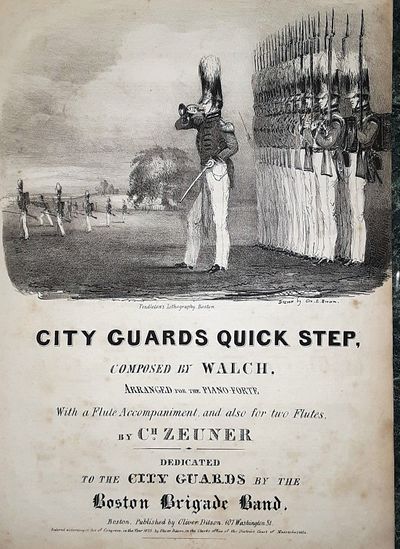Annotation:City Guards (1)

During the Fall muster in 1837, while the established militia companies were standing in regimental line, the newly formed Irish "Montgomery Guards" marched in to take their place in the regimental line. Six of the older companies, led by the anti-Irish City Guards, marched off the field in protest of this "invasion by foreigners". After a court martial, the City Guard and several other companies were disbanded. The City Guard promptly re-organized under the name "City Greys", which meant they could also keep using the same accouterments, buttons, etc. with the initials "CG". However, within several years, they went back to the name City Guard.[1]
In some locales, such as Edinburgh, the City Guards were the precursors to the official police force, established around 1696. They were abolished in that city in November, 1817, after which the police assumed all their remaining duties. The populace, at least in the latter years, called them "The Toon Rottens," according to Henry Cockburn (1779-1854), writing in his posthumous memoir Memorials of His Time (1856):
The police has made them useless; but I wish they had been perpetuated, though it had been only as curiosities. Their number was liable to be increased or diminished according to circumstances. At this period they amounted, I conjecture, to about 200, regimented like ordinary soldiers. They were all old, hard-featured, red-nosed veterans; whose general history was, that after being mauled in the wars, commonly in a Highland regiment, they thought themselves fortunate if they got into this fragment of our old burgher militia, where the pay was better than nothing, and the discipline not quite consistent with whisky, while the service was limited to keeping the peace within the city. Naturally disliked by the people they were always asserting their dignity by testy impatient anger. This excited the mischief and the hostility of the boys, by whom their small remains of temper were intolerably tried; and between the two there never ceased to be a cordial and diverting war. Their uniform was a red coat turned up with blue, a red waistcoat, red breeches, long black gaiters, white belts, and large cocked hats bound with white worsted ribbon. They had muskets and bayonets, but rarely used them; for their peculiar weapon was the old genuine Lochaber axe-a delightful implement. One saw Bannockburn in it. One of these stern half-dotard warriors used to sit at each side of the prisoners at the bar of the Court of Justiciary as guard; with his huge hat on his old battered head, and his drawn bayonet in his large gnarled hand. They sat so immovably, and looked so severe, with their rugged weather-beaten visages, and hard muscular trunks, that they were no unfit emblems of the janitors of the region to which those they guarded were so often consigned. The disappearance of these picturesque old fellows was a great loss. (pp. 322-323)

